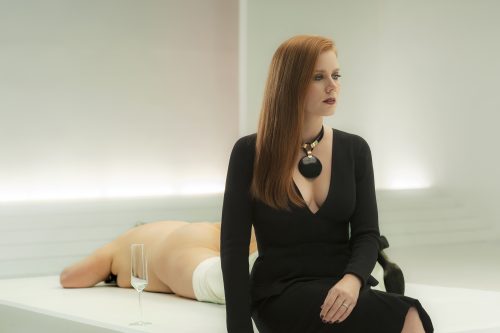
Tom Ford’s second feature, , is a movie within a movie, and while both are lushly attractive, full of precise light and deep reds, neither is very good.
Tom Ford’s second feature, Nocturnal Animals, is a movie within a movie, and while both are lushly attractive, full of precise light and deep reds, neither is very good.
Ford, who is more famous as a fashion designer, has an eye for a certain kind of pristine, art-directed beauty — an eye that served him well in 2009’s A Single Man, the film that made me take Colin Firth much more seriously. But no one in Animals can bring the same soul to the movie’s multiple narratives.
Susan (Amy Adams) is a Los Angeles gallery owner too unhappy to relax into the world she’s built with her handsomely bland husband, Hutton (Armie Hammer). Wealth and passivity come easily to her; when she gets a paper cut opening an unexpected package, her household staff finishes the task.
In the package is a copy of her ex-husband Edward’s new novel, Nocturnal Animals, which is dedicated to Susan. As she begins to read, the movie becomes the novel, a well-worn tale of violence and revenge about Tony (Jake Gyllenhaal), whose family encounters a trio of West Texas hoodlums.
Ford finds beauty in the hot desert light, as Gyllenhaal takes long baths and Michael Shannon steals scenes as a morally iffy detective. The film continually cuts to Susan, who’s a stunningly dramatic reader, always dropping the manuscript or gasping. As she reads, the movie adds a third timeline: the story of Susan and Edward (also Gyllenhaal) as young, not-yet-successful New Yorkers.
It’s clear that Edward has not written anything like this book before; it’s also clear that he never took Susan’s advice to write about something other than himself. Through Tony’s story, Edward indicts Susan as the architect of both of their unhappiness. Her parallel character isn’t Laura, the fictional wife, played by Adams lookalike Isla Fisher; Susan is the threat, the wild-eyed predators who drive Tony’s family off the road in the night.
If you are inclined to be very, very generous, to overlook the clichés and heavy-handed mirroring between narratives, you might be able to view Ford’s film (based on a novel by Austin Wright) as something of a perspective on toxic masculinity. This would be easier if Susan had more to do than react to Tony’s, and by extension Edward’s, tale — a tale that appears to end when Edward, having concluded his revenge fantasy, finally exhausts his need to turn Susan’s emotions to his own ends.
There are bright spots in Nocturnal Animals, including too-brief appearances from Jena Malone and Michael Sheen. Adams, in heavy eyeliner, stares compellingly into the distance as her ex’s fiction makes her question all of her choices, but it’s hard to get past the way Tony, and by extension Edward, appropriates everyone else’s pain as his own. Is it a commentary on novelists? On art people who no longer connect to art? Or just an excuse to make two films at once, and let Amy Adams sprawl on expensive couches for a spell?
As shallow as it is pretty, Nocturnal Animals seems to have misplaced its heart. Perhaps it’s stuffed in one of the closets in Susan’s house, put there by a butler who saw no pressing need for such a thing. (Broadway Metro)